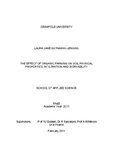JavaScript is disabled for your browser. Some features of this site may not work without it.
| dc.contributor.advisor | Godwin, R. J. | |
| dc.contributor.advisor | Sakrabani, Ruben | |
| dc.contributor.advisor | Whitmore, A. | |
| dc.contributor.advisor | Pearce, B. | |
| dc.contributor.author | Hathaway-Jenkins, Laura Jane | |
| dc.date.accessioned | 2011-12-08T15:34:35Z | |
| dc.date.available | 2011-12-08T15:34:35Z | |
| dc.date.issued | 2011-02 | |
| dc.identifier.uri | http://dspace.lib.cranfield.ac.uk/handle/1826/6798 | |
| dc.description.abstract | Organically managed land has increased to 4 % of the total area of agricultural land in the UK. Changing land management can impact upon the rural environment (soils, hydrology and biodiversity) and rural community (socio-economics and culture). This thesis aims to compare the effects of organic farming practices on soil physical, chemical and hydrological properties in relation to conventional farming systems. The research combines data from three different scales: field measurements, plot measurements and catchment modelling. At the field scale: 16 pairs of farms (organic and conventional between 50 and 3000 m apart) located in England, over a range of soil textures: clayey, silty, medium and coarse were investigated. There were also two different land uses (grass and winter wheat). Data was obtained on soil properties including: shear strength, Atterberg limits, field capacity, aggregate stability, HOST values, infiltration rates and Soil Organic Carbon (SOC). The analysis of the data shows that, whilst it is possible to detect the effects of both soil texture and land use (grassland / arable) on a number of the soil properties; there is no evidence that organic farming improves soil properties or physical condition - equally there is no detrimental effect. This is in agreement with the results of a number of other European studies. There was evidence to show that infiltration rates are greater on organically managed grassland than conventional grassland; which agrees with the HOST analysis where fewer fields were degraded under organic management. Fewer traces of pesticides and herbicides were in the soil water from the organic fields compared with the conventionally managed fields; none were at a level which would contribute to agricultural pollution. Cont/D. | en_UK |
| dc.language.iso | en | en_UK |
| dc.publisher | Cranfield University | en_UK |
| dc.rights | © Cranfield University 2011. All rights reserved. No part of this publication may be reproduced without the written permission of the copyright owner. | en_UK |
| dc.title | The effect of organic farming on soil physical properties, infiltration and workability | en_UK |
| dc.type | Thesis or dissertation | en_UK |
| dc.type.qualificationlevel | Doctoral | en_UK |
| dc.type.qualificationname | EngD | en_UK |
